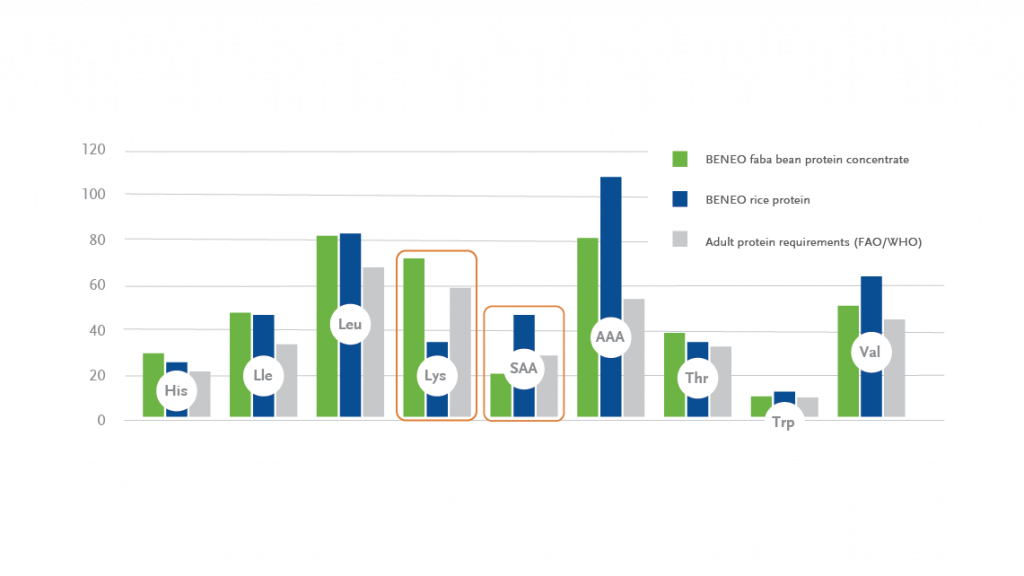Sustainable protein enrichment with faba bean | BeneoPro
Vicia faba, also known in the culinary sense as broad bean, fava bean or faba bean, is widely cultivated as a crop for human consumption, and even considered as one of the earliest domesticated legumes.
Our faba bean is grown with local farmers and its protein obtained via a dry fractionation process in the processing plant in Offstein, Germany. This state-of-the-art factory, built with sustainability in mind, uses significantly less energy and water than traditional wet processing methods typically used to produce protein isolate.
Nutritional benefits:
- Plant-based protein enrichment
- Allergen-friendly:
Free-from dairy
Food application with BeneoPro FB:
Protein enrichment & amino acid profile … .
Faba bean protein concentrate contains a minimum of 60% protein on dry matter and enables clean plant-based protein enrichment in bakery, dairy and meat alternatives. It is particularly rich in lysine, allowing for complete essential amino acids profile when combined with cereal protein, such as BENEO’s Remy rice protein (high in sulphur amino acids/SAA) or BENEO’s wheat Protein. These combinations can provide targeted and flexible solutions with desired attributes for the baking sector.
Rice and Faba protein for a complete essential amino acid profile

Versatile functionality: solubility, emulsification, foaming
The emulsifying capabilities of our faba bean protein helps to stabilize oil-water systems, while its foaming capacity enables efficient air incorporation. Beyond these functions, its texturizing and binding properties play a key role in building and maintaining structure, while further contributing to enhanced body, creaminess and overall product stability.
Our faba bean protein concentrate offers a functional alternative to eggs & dairy proteins. As protein-enriched smoothies and vegan dairy-free drinks continue to be part of consumers’ healthy lifestyles, the naturally good solubility at neutral & higher pH of faba bean protein also proves to be a key advantage, providing a clean-label protein source suitable for beverages, bakery and snack applications.
Faba bean protein for a sustainable consumer answer
With the production of its faba bean ingredients range, BENEO considers the entire supply chain – from sourcing the raw materials and collaborating with farmers to its own production processes – to deliver appealing sustainability credentials.
At farm level, faba beans…
- Fix nitrogen naturally from the air: no nitrogen fertiliser needed, also benefitting future crops by enhancing soil quality and reducing greenhouse gas emissions
- Increase biodiversity: faba bean flowers serve as a food source for pollinator insects
- Do not require irrigation grown in a region with good rainfall and soils with good water storage capacity, helps conserve valuable water reserves • Enhance soil quality: improved soil structure thanks to tap roots and less tillage required for following crops
At production level, BENEO’s faba bean ingredients are made…
- With a dry fractionation process, requiring no water, chemicals or processing aids and less energy than conventional wet methods used for protein isolates
- In a plant powered by 100% renewable energy sources and waste heat is used to warm the building • With a zero-waste approach, ensuring full valorisation, with faba bean hulls used as a fibre source for animal feed
What do consumers have to say about faba bean protein?
Let’s hear what the consumers have to say about the plant-based protein from faba bean. A recent consumer survey shows that their first impressions are very positive.
Many of them like vegetable-based proteins such as beans and pea. Some of them were very aware of the nutritional value of protein offered by beans. Let’s have a look at their insights.
Discover consumer and market perspectives on faba bean ingredients in our recent expert interview.
Faba bean protein range – composition
- Ingredient name
- Protein1 (g/100g)
- Carbohydrates1 (g/100g)
- Fibre1
- Ingredient name
- Faba bean Protein concentrate
- Protein1 (g/100g)
- 612
- Carbohydrates1
- 1.9
- Fibre1
- 17
- Ingredient name
- Faba bean starch-rich flour
- Protein1 (g/100g)
- 21
- Carbohydrates1
- 59
- Fibre1
- 4.7
- Ingredient name
- Faba bean flour
- Protein1 (g/100g)
- 29
- Carbohydrates1
- 46
- Fibre1
- 8.5
1 Indicative typical contents; protein values (Nx6.5) (according to EU food legislation)
2 Contains min. 60% protein on dry matter
Unveiling the power of faba bean protein

Future-proofed nutrition with faba bean ingredients
Explore our range of faba bean protein concentrate and starch-rich flour. A cost-effective and sustainable protein alternative with versatile functionality in a wide range of food applications.





